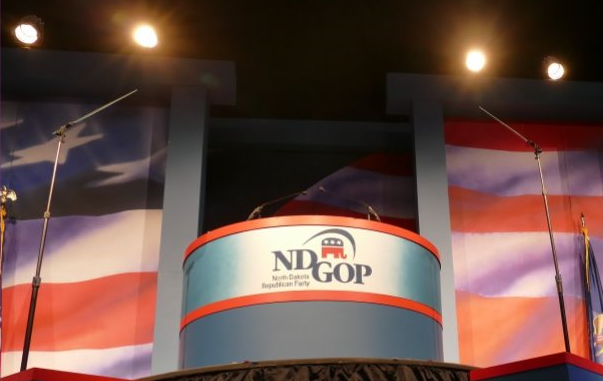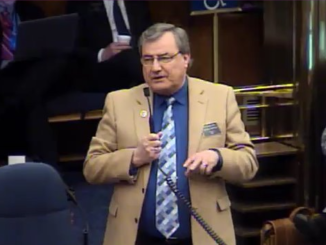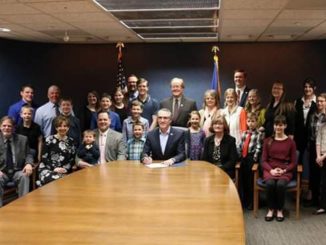
Last week it finally hit the news that the North Dakota Republican Party will be considering a resolution this week calling for changes to state law in how political parties nominate their candidates for general elections. In a document released to The Minuteman, it’s being called “NDGOP Grassroots Empowerment Initiative.” As the Bismarck Tribune sums it up, the resolution would:
“… give parties more flexibility on how they nominate their candidates for the general election ballot, allowing them to use a caucus or convention of its members rather than a primary election open to all of the state’s voters.” (Emphasis Added)
As it stands now, a candidate can obtain the party’s endorsement at a convention, but end up not winning the nomination if they’re challenged in a June primary and lose. This has happened on a number of occasions. The most recent high profile examples in North Dakota politics are Congressman Kevin Cramer and Governor Doug Burgum. Cramer beat the Republican-endorsed candidate Brian Kalk in 2012. Burgum walloped the Republican-endorsed Wayne Stenehjem in 2016.
As you can imagine, news of this proposal has been met with a variety of responses from total embrace to outright disdain for the idea. This was to be expected. It’s an interesting dynamic though. Even among those of us who often decry “establishment politics” you’ll find division on this issue.
So, why would I support the idea? Political parties are private organizations. And as such, the state should not be dictating to them how they select their nominees for various offices. It’s really that simple. Not much else matters.
I want to be very clear that if the legislation being called for ultimately matches what the resolution intends, then it does not necessarily mean all nominees would be determined by the convention process. As mentioned in the NDGOP Grassroots Empowerment Initiative, the “governing bodies of the respective parties [would] have the choice to employ or eschew this option.” One district’s governing body may choose a convention, some a caucus, and others the primary. In fact, a governing body could choose to maintain the current practice of endorsing candidates and allowing the primary to ultimately determine the nominees. The key here is that it would be up to the party’s discretion going forward, not the state’s.
Regardless of the method utilized in determining its nominees, the party’s governing body would then be required to file a Certificate of Nomination with the North Dakota Secretary of State’s office and those nominee’s would appear on the general election ballot.
One of the arguments against determining nominees through a convention, instead of a primary, is that it will marginalize the electorate. I disagree with this assessment. It’s only true if people choose not to be involved. The process used to determine a party’s endorsed candidates or nominees is publicized and open to all qualifying participants of the party. It’s true that delegate slots to a State Convention are limited, but it’s the party faithful (i.e. attendees/people) at District Conventions that elect those delegates to represent them. As it stands now, a significantly large number of those delegate spots go unfilled due to lack of interest in a process that can ultimately have its outcome changed by a primary vote.
If we want to talk about being marginalized, how do you suppose delegates feel when they attend a State Convention, work hard within the party to get their candidate(s) of choice endorsed, and then have it all upended in a primary election by a candidate who may not reflect the values and platform espoused by the party as well as the endorsed candidate did?
There’s a myriad of what if’s and maybes that could be discussed in relation to this issue. In and of themselves, there’s points to be had from both sides that have merit. In fact, we could get lost in a discussion about them. And that’s the problem— we often get lost in that discussion.
For me, the most important thing is this… these are private organizations. They alone should get to determine the process by which those who represent them are selected, not the state.
Ultimately, general elections will determine winners and losers.
Do I think the resolution will be passed by the NDGOP State Committee this week? I do. Do I think it will pass as legislation during the 2019 Legislative Session and be signed into law by Governor Doug Burgum? I don’t. Why? Not only could such a law have ramifications for some of the very people voting on it, but it would mean a fairly significant change in our political process. And I think people and legislators alike are very resistant to change. Not to mention the fact that far too many lawmakers love to blur the lines between government and private organizations.
Having said all this, if I’m wrong and this somehow passes, then I suspect we’ll see more people run either as third party candidates or as Independents. I don’t think that’s necessarily a bad thing. Especially if some of the RINO’s in the Republican party head on over to the Democratic party where they belong.
Sources:
- https://www.grandforksherald.com/news/government-and-politics/4539978-north-dakota-gop-eyes-law-change-allowing-parties-avoid-bitter
- https://ballotpedia.org/Kevin_Cramer
- https://ballotpedia.org/Doug_Burgum





